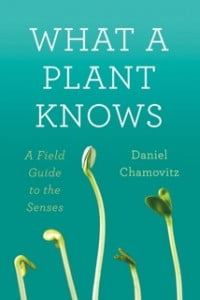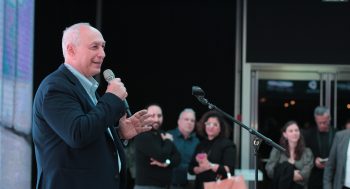From Aliquippa, Pennsylvania, Danny Chamovitz was brought up to follow in the footsteps of his family: Columbia pre-med, then medical school, then medical practice.
It wasn’t until he spent a year in Israel that Chamovitz discovered his true passion: plants. Now, Chamovitz is the Director of the Manna Center for Plant BioSciences at Tel Aviv University.
“Our future existence on earth is totally dependent on plants,” Chamovitz plainly tells NoCamels. “The chair you’re sitting on, the clothes you’re wearing, the drink you’re drinking. It’s all somehow dependent on plants.”
Chamovitz believes that many people ignore plants, since they don’t move. However, he says, since plants don’t move, they can’t escape an uninhabitable environment. To Chamovitz, the answer is unequivocal: “It is essential to our future here on earth that we understand how plants adapt to changes such as global warming.”
What A Plant Knows
Chamovitz realized that what was obvious to him, that plants “know things”, was not so obvious to others around him. That was the inspiration behind his book “What a Plant Knows”, now published in 13 languages.
In the book Danny focuses on plants’ senses, including touch and smell, and their response to light.
“It’s a little controversial to say that plants smell, feel, see, and can even remember things, but maybe we need to reassess what these words mean for us,” Chamovitz tells NoCamels. “The plant knows when it’s being touched, it just doesn’t know who’s touching it.”
When Chamovitz started studying plants, he says he soon “began to realize that basic mechanisms are the same in both plants and humans.”
It is this idea, that plants have the same basic senses as us humans, which planted the seeds for Chamovitz’ current research. “The research in the lab started as a question of basic science, what basic mechanisms enable plants and animals to make decisions?”
Sign up for our free weekly newsletter
Subscribe“We discovered the basic mechanisms going on in the plant cells are the same basic mechanisms going on in human cells also,” Chamovitz tells NoCamels. “And by figuring out the processes of plant cells through these basic mechanisms, we can gain a better understanding of the processes going on in our own human cells,” he adds.
A calling from the holy land
A product of Zionist upbringing, Danny Chamovitz attended Young Judaea’s Year Course, a gap year program in Israel after High School. It was in the last months of the program, while living on Kibbutz Ketura in the south of Israel, and spending many long hours harvesting the alfalfa fields that Danny first discovered his fascination with plants. “I was fascinated by harvesting alfalfa, when you cut it , it grows back!” Chamovitz exclaimed. “Wheat doesn’t grow back. If only we could make wheat like alfalfa we could solve world hunger.”
With his newfound passion for agriculture, Chamovitz decided to study plant genetics at the Hebrew Univeristy of Jerusalem. He graduated from the university with an undergraduate degree in biology and a PhD in plant physics.
Solving world hunger
As the Director of the Manna Center for Plant BioSciences at Tel Aviv University, Chamovitz is heading a new program at the University for Food Security. “This interdisciplinary program meshes research training and outreach in order to find solutions for world hunger.”
He explains: “The solutions [for] world hunger are interdisciplinary, they require students of life sciences, public health, economics and public policy to work together.”
The goal of the program is to become the main center in Israel for food security, “eventually, we hope for the program to grow internationally to include students from developing countries.”
Main Photo: Reproduction, Courtesy / SLV Native
Related posts

'Startup On Steroids': Civilians Raise $3.7M To Equip IDF Troops

Comeback Kid: WeWork Founder Plans A Real Estate Revolution






Facebook comments